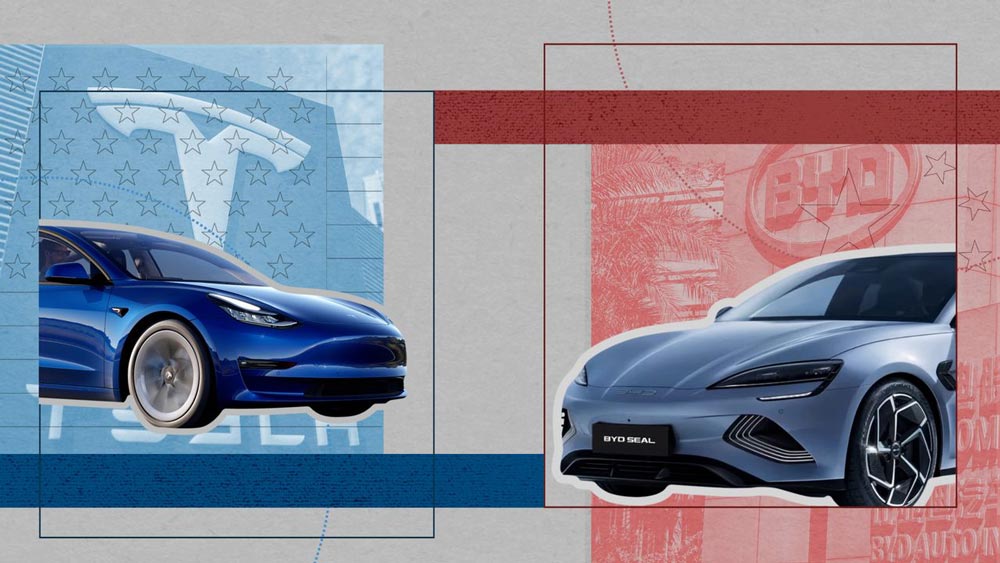China’s electric vehicle (EV) market is witnessing a fierce battle for dominance as local automakers strive to outperform Tesla, the American EV giant. In a bid to attract consumers, Chinese companies are leveraging cutting-edge technology and introducing innovative features not yet available in Tesla vehicles. This aggressive push is reshaping the EV landscape in China, turning electric cars into consumer electronics products akin to the booming cellphone industry. This article explores the surge in competition, the remarkable technological advancements, and the changing dynamics of the Chinese EV market.
The Rise of Advanced Features
Chinese automakers are no longer solely focused on driving range as a competitive advantage. Instead, they are revolutionizing the market by equipping their vehicles with a wide range of features to enhance the driving experience. In-car projectors, refrigerators, and advanced driver-assist systems are just a few examples of the cutting-edge technology being integrated into Chinese electric cars. These features provide passengers with entertainment options, convenience, and a glimpse into the future of mobility.
A Glimpse into the Technological Advancements
One notable player in the Chinese EV market, Appotronics, a Shenzhen-based laser display company, collaborates with major automakers to introduce advanced features in their vehicles. Li Yi, Chairman and CEO of Appotronics, highlights the increasing demand for car tech in China. He predicts that the new autos segment will generate substantial revenue, ranging from “a few hundred million” yuan (equivalent to $40 million to $100 million) this year. Chinese consumers are eager to embrace the most advanced tech specs, unlike their European counterparts who prioritize functionality.
The Battle of Features and Pricing
Chinese automakers are introducing a myriad of features that surpass Tesla’s offerings in the market. For instance, the Aito M9 SUV boasts reclining chairs in the second row, an in-car projector screen, and a refrigerator compartment, providing passengers with a luxurious and entertaining experience. Li Auto’s L9 SUV integrates an augmented reality head-up display (AR HUD), a refrigerator, and driver-assist technology. Xpeng’s G9 SUV stands out for its advanced driver-assist capabilities. These features, coupled with competitive pricing, are attracting Chinese consumers.
While Tesla’s Model Y and Model S are priced at 258,900 yuan and 698,900 yuan respectively, Chinese electric cars with similar or even more advanced features are available at comparable or lower prices. The price range for the Aito M9 SUV is around 470,000 yuan to 570,000 yuan, Li Auto’s L9 SUV starts at 429,900 yuan, and Xpeng’s G9 SUV starts at 289,900 yuan. This pricing strategy puts pressure on Tesla to adapt to the evolving market demands in China.
The Impact on the EV Market
The intense competition in China’s EV market is reshaping the industry dynamics. Over 100 new EV models are set to launch in China in 2024, signaling the rapid growth and innovation in the sector. Chinese consumers are increasingly drawn to electric vehicles that offer advanced in-vehicle tech features and driver-assist capabilities. This shift in consumer preferences puts pressure on traditional foreign auto giants like Volkswagen, while domestic companies and technology firms such as Xiaomi and Geely-backed startup Zeekr are eager to penetrate the market.
The Future of Chinese EVs
As Chinese automakers continue to invest in advanced technology and prioritize consumer demands, the gap between Chinese electric cars and Tesla’s offerings is narrowing. Chinese customers’ willingness to pay a premium for car tech further incentivizes local manufacturers to push the boundaries of innovation. Moreover, China’s dominance in the supply chain for electric car batteries gives local companies, such as BYD, a competitive edge. BYD has already surpassed Tesla in total car production and battery-only sales, underlining the significance of local expertise.











